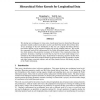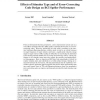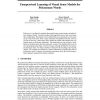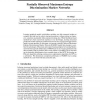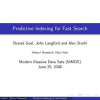NIPS
2008
13 years 10 months ago
2008
In kernel-based regression learning, optimizing each kernel individually is useful when the data density, curvature of regression surfaces (or decision boundaries) or magnitude of...
NIPS
2008
13 years 10 months ago
2008
One of the original goals of computer vision was to fully understand a natural scene. This requires solving several sub-problems simultaneously, including object detection, region...
NIPS
2008
13 years 10 months ago
2008
Regularized Least Squares (RLS) algorithms have the ability to avoid over-fitting problems and to express solutions as kernel expansions. However, we observe that the current RLS ...
NIPS
2008
13 years 10 months ago
2008
Neural activity is non-stationary and varies across time. Hidden Markov Models (HMMs) have been used to track the state transition among quasi-stationary discrete neural states. W...
NIPS
2008
13 years 10 months ago
2008
We develop new techniques for time series classification based on hierarchical Bayesian generative models (called mixed-effect models) and the Fisher kernel derived from them. A k...
NIPS
2008
13 years 10 months ago
2008
Bartlett et al (2006) recently proved that a ground condition for convex surrogates, classification calibration, ties up the minimization of the surrogates and classification risk...
NIPS
2008
13 years 10 months ago
2008
From an information-theoretic perspective, a noisy transmission system such as a visual Brain-Computer Interface (BCI) speller could benefit from the use of errorcorrecting codes....
NIPS
2008
13 years 10 months ago
2008
Polysemy is a problem for methods that exploit image search engines to build object category models. Existing unsupervised approaches do not take word sense into consideration. We...
NIPS
2008
13 years 10 months ago
2008
Learning graphical models with hidden variables can offer semantic insights to complex data and lead to salient structured predictors without relying on expensive, sometime unatta...
NIPS
2008
13 years 10 months ago
2008

